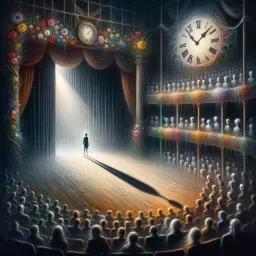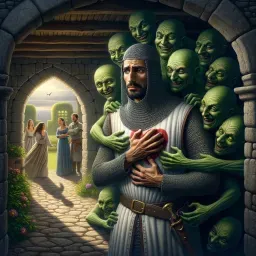”How sharper than a serpent'
s tooth it is to have a thankless child!“

0
0
0
0
- Meaning
- This phrase expresses the deep emotional pain and betrayal felt by a parent when their child is thankless or ungrateful. Shakespeare uses the metaphor of a serpent's tooth to vividly convey the sharp, biting pain of such ingratitude, likening it to the venomous bite of a snake. The comparison to a serpent's tooth implies an unexpected and hurtful betrayal from someone closely trusted and loved.
- Allegory
- The elderly figure in a regal attire with the slipping crown represents King Lear and his diminishing authority and power. Clutching his heart symbolizes the deep emotional pain he feels. The serpents weaving around him signify betrayal and the sharp, biting pain of ingratitude, akin to the teeth of a snake. The indifferent, statue-like children with their backs turned to him emphasize the coldness and ungratefulness that cuts Lear so deeply. The dark, storm-laden sky in the background mirrors the tumultuous and chaotic feelings of betrayal and loss.
- Applicability
- In modern contexts, this phrase can be applied to various relationships, not just between parents and children. It highlights the emotional turmoil that can arise from ungratitude and serves as a reminder to appreciate and acknowledge those who support us. In everyday life, being mindful of expressing gratitude can strengthen relationships and foster goodwill.
- Impact
- This phrase has had a significant impact on literature and popular culture, often cited in discussions about familial relationships and ingratitude. Its poignant imagery has made it memorable, reinforcing the emotional consequences of ungrateful behavior. The phrase has also inspired various adaptations and references in other literary works, movies, and social commentaries.
- Historical Context
- “King Lear” was written between 1605 and 1606 and is one of Shakespeare’s later tragedies. During this period, societal values placed strong emphasis on familial duty and loyalty. The historical context reflects the importance of hierarchy and respect within the family unit, making the theme of ingratitude particularly poignant.
- Criticisms
- Some critics might argue that the phrase reflects a paternalistic view, emphasizing the authority and expectations of parents over their children. There might also be critiques regarding its use to pressure children into compliance and gratitude, potentially overlooking genuine grievances or the need for empathy towards younger generations.
- Variations
- There are no direct famous variations of this specific phrase, but variations occur across cultures that emphasize the pain of ingratitude. For instance, in Chinese culture, the phrase “养儿不教如养头驴,” meaning "Raising a child without teaching is like raising a donkey," reflects the importance of proper upbringing and gratitude within family structures.
-

The empty vessel makes the loudest sound.
-

Life's but a walking shadow, a poor player that struts and frets his hour upon the stage and then is heard no more.
-

Love all, trust a few, do wrong to none.
-

O, beware, my lord, of jealousy; It is the green-ey'd monster which doth mock the meat it feeds on.
-

Words, words, mere words, no matter from the heart.
-

O, what a rogue and peasant slave am I!
-

Give sorrow words; the grief that does not speak knits up the o-er wrought heart and bids it break.
-

There was never yet philosopher that could endure the toothache patiently.
-

I wasted time, and now doth time waste me.
-

The smallest worm will turn, being trodden on.
-

False face must hide what the false heart doth know.
-

I will praise any man that will praise me.
No Comments